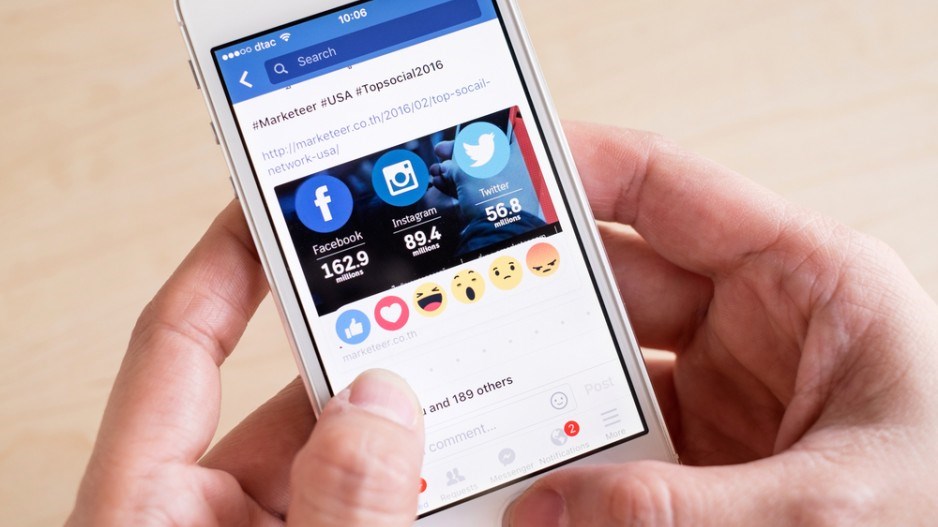A few years ago, the most recurrent joke about social media was related to the arrival of “your parents” to Facebook. It was time for young Canadians to scrap all those photographs where they found themselves surrounded by shot glasses or bongs, as well as anything that may have seemed remotely lewd. Only then could relatives be accepted as Facebook friends.
Social media users are now ubiquitous all over the country. In the middle of a federal electoral campaign, the influence of these platforms in shaping the perceptions of voters is undeniable. We have seen poll findings become shareable memes that purport to show wide support for a policy, even if the questionnaire’s options or data collection were subpar. When it comes to the past of political contenders, innuendo has taken the place of reasoned analysis. This leaves the airwaves, in traditional and social media, with little time to discuss what matters to voters: the present and the future.
Research Co. asked Canadian social media users about their experiences online and found ample appetite for some changes, as well as a great degree of confusion when it comes to what is real and what is bogus.
There are certain aspects of social media that have been exploited for political purposes. The number of accounts discussing a particular issue, as well as the number of “likes,” can provide an illusion of saliency. In reality, widely shared content may be part of a co-ordinated effort of misinformation, as we saw all too well during the 2016 United States presidential campaign.
More than seven in 10 Canadian social media users (72%) told us that it is difficult to discern which social media accounts are real and which ones are fake. As a society, we no longer put much stock in emails that guarantee us a large sum of money by collaborating with the descendants of a prince. On social media, there is still a lot of work to be done to abandon rumour and ensure that we share links that report real stories.
A case in point is the barrage of Twitter accounts that masquerade as real news sources – complete with logos and website formats – to advance the sales of a supposed “miracle pill.” Social media platforms have been unable to eradicate these accounts with their verification systems. It is up to individual social media users to figure things out.
Across the country, two-thirds of social media users (68%) believe “anonymous” social media accounts should be banned and want people to comment and post only if they use their real name and likeness.
While this may be a particularly problematic regulation for those who are unable to comment on issues on account of their jobs or positions, the numbers clearly show that Canadians are getting tired of acrimonious messages that arrive in their feed from someone with no name and no face.
Most social media users in Canada (60%) also believe it is time to deal with “creeping” and believe platforms should always allow users to see who has viewed their profiles, photos and posts. Muting and blocking are helpful tools, but there is really no way to know who is watching what we do and say online – and how it may be used against us.
We also asked Canadians about politicians who have a social media account and block users from engaging with them. More than three in five (63%) believe elected officials should not be able to do this. #BlockedBy has become a hashtag of note on Twitter whenever a politician’s name is added at the end. These exchanges are not always pleasant, and politicians and citizens alike can be blamed for failing to meet the standards of acceptable discourse.
The most disturbing finding is that two in five Canadian social media users (41%) say they found links to stories on current affairs that were obviously false. Women appear to be slightly better than men at figuring out if something that was shared is real (48% to 44%).
Still, the biggest discrepancy is generational. While almost half of Canadian social media users aged 18 to 34 (48%) claim to have been exposed to evident “fake news,” the proportion drops to 41% among those aged 35 to 54 and 36% among those aged 55 and over.
Canada’s youngest voters, who grew up with the internet, smartphones and social media, are more likely to identify stories that are not genuine than their older counterparts.
We may have experienced discussions around the dinner table at Thanksgiving where “something a friend sent to me” about a candidate, a party or a product is summarily debunked by younger and savvier social media users.
So, yes, millennials, your parents are on Facebook. And now they need your help discerning authenticity from fabrication. •
Mario Canseco is president of Research Co.
Results are based on an online study conducted September 24–26 among 840 adult social media users in Canada. The data has been statistically weighted according to Canadian census figures for age, gender and region in Canada. The margin of error, which measures sample variability, is plus or minus 3.4 percentage points, 19 times out of 20.




